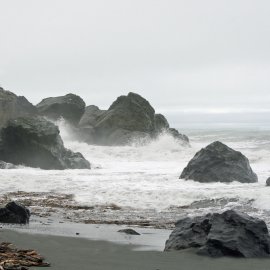World Ocean Assessment, Part 4
-
English
-
ListenPause
I’m Peter Neill, Director of the World Ocean Observatory. In this fourth and final edition devoted to the recently published UN World Ocean Assessment, I want to focus on one example – the State of Oregon in the US – where many of the myriad issues and recommendations enumerated in the Report are in process in encouraging array. As the ocean is complicated, it can only be that the governmental response be complicated as well, and it is heartening to discuss one place where legislators, administrators, researchers, academics, and the public agree and support a responsible and active approach to ocean knowledge and sustainability. Oregon describes its stewardship interest in the ocean as follows: “The Oregon coast and Pacific Ocean are of fundamental importance to Oregonians. The ocean shore and near shore ocean waters comprise an important ecological zone with a wide range of habitats on land and at sea for many species of plants and animals that are specifically adapted to this unique environment. Commercial and recreational fisheries, transportation and navigation, and recreation are all ocean uses upon which coastal communities rely for their livelihoods and way of life. The State of Oregon is committed to the long-term integrity of marine ecosystems and the sustainable use of ocean resources. Since 1977, Oregon has had a strong policy of protecting renewable ocean resources and, since 1991, the state has had a robust program to ensure the long-term sustainable use of ocean resources. Oregon has jurisdiction over the three nautical mile-wide Territorial Sea but has stewardship interests across the entire continental margin.” The State website, Oregon Ocean Information, defines itself as “a resource for planning in the territorial sea.” As such, it contains a full catalogue of communications tools – newsletters, articles, local reports, explanatory videos and public outreach materials for all levels of interest – but also focuses on several key interests : marine spatial planning, ocean acidification, marine reserves, ocean energy, and the activities of a near shore task force charged by the State legislature to develop recommendations on a long-term funding and coordination strategy to meet the state’s near shore research priorities and provide guidance on how the task force will implement the intent of the bill.” Acidification, the changing pH of the ocean as a result of global emissions, is one of the most challenging, and least understood of the many ocean issues. Investigate projects are on-going to document changing acidity impact on the hypoxic zone off coast, the failure of a local shellfish hatchery, related observation programs, alliances with scientist-mangers to apply research to management actions, grants and panels to explore additional issues, and the engagement of public “citizen scientists” in monitoring and support of all these initiatives. There is a good deal more, and Oregon is not the only government in the United States or elsewhere with such an active interest. What is important here is that these programs represent and contribute to first actions in local support of the larger perspective of the World Ocean Assessment agenda. What is also important here is that we realize that these issues pertain everywhere, not just in the Pacific Ocean but along shore worldwide. Our engagement must be universal, the alliance between policy makers and legislators, scientists and educators and communicators, administrators, voters, and the public, must be real and proactive if the broad-based applications of what we know, and what we can do about it, can align to significant effect. It is fair to say that any assessment of the world ocean will conclude that the system is challenged in every way that it relates to our future. It is also fair for “citizens of the ocean” to demand responsible and urgent response, in Oregon and in all places worldwide where we are connected by the sea. We will discuss these issues, and more, in future editions of World Ocean Radio. World Ocean Radio is distributed by the Public Radio Exchange and the Pacifica Network. Find our podcast on iTunes and at World Ocean Observatory dot org.
In this fourth and final episode dedicated to outlining the complexities contained in the United Nations World Ocean Assessment, host Peter Neill focuses on the State of Oregon in the US, where a robust ocean stewardship program is in place, focusing on many of the issues and utilizing recommendations outlined in the Report.
About World Ocean Radio
Peter Neill, Director of the World Ocean Observatory and host of World Ocean Radio, provides coverage of a broad spectrum of ocean issues from science and education to advocacy and exemplary projects. World Ocean Radio, a project of the World Ocean Observatory, is a weekly series of five-minute audio essays available for syndicated use at no cost by college and community radio stations worldwide. A selection of episodes is now available in Portuguese, Spanish, French, Swahili, and Mandarin, enabling us to reach 75% of the world's population. For more information, visit WorldOceanObservatory.org/world-ocean-radio-global.
Resource from this Episode
< "The First Global Integrated Marine Assessment:
World Ocean Assessment 1" | UN.org
< Oregon Ocean Information
World Ocean Radio Series:
< World Ocean Assessment, Part 3
< World Ocean Assessment, Part 2
< World Ocean Assessment, Part 1
- Login to post comments



